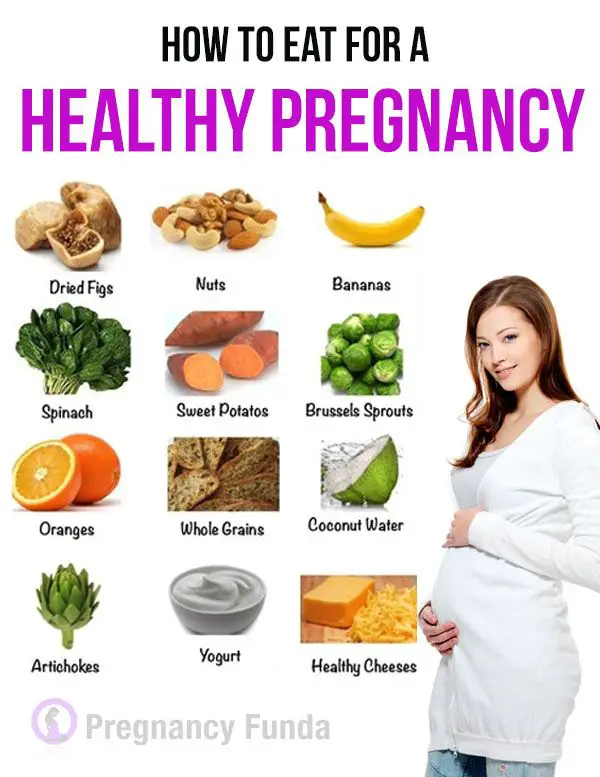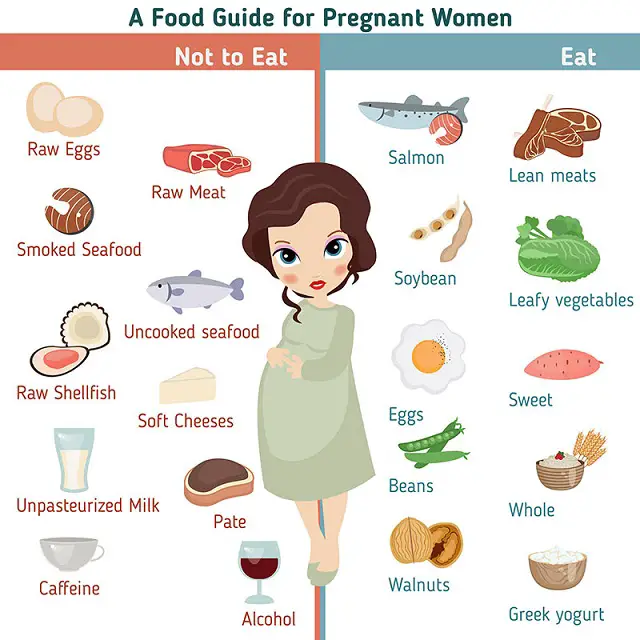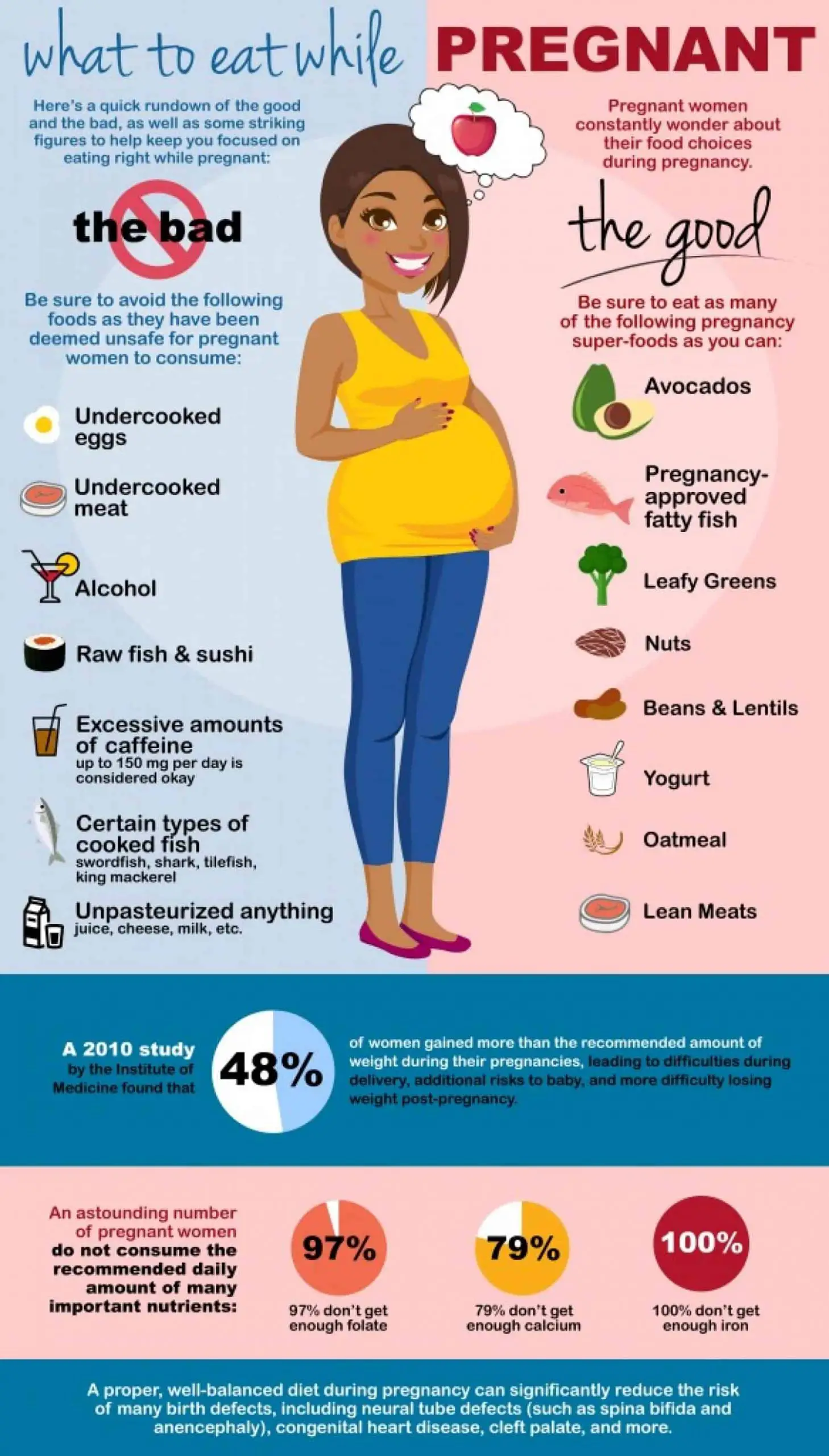Liver And Other Organ Meats
Organ meat can be a great source of a variety of nutrients. It includes copper, selenium, zinc, vitamin A, vitamin B12 and iron all of which can be good for your baby. However, when it comes to eating too much animal-based vitamin A, it is not recommended during pregnancy.
Animal-based vitamin A is also known as formed vitamin A and consuming too much of it in the first trimester of pregnancy can lead to congenital malformation and even miscarriage.
Though the greatest risk of formed vitamin A comes through vitamin A supplements, it is best to limit your organ mean consumption. This means you should not look to consume liver for instance more than a few ounces per week.
What Should Be Eaten During Pregnancy
Take balanced and nutritious food and arrange food in such a way that every month the weight of the pregnant woman increases by one kilo. Under the norm, it is considered appropriate for a pregnant woman to increase her weight by 10-12 kg from her normal weight during delivery.
Vegetarian food is the best during this time. Just keep in mind that the food should be balanced and the weight does not increase excessively. Milk and milk products and fresh coconut water can be consumed during pregnancy. In the last months, due to increasing weight, there may be difficulty in lying down at night, in such a situation, consume fruits only in the evening.
Proper diet is very important for easy delivery. The food should have the right balance of fresh fruits, vegetables, pulses etc. Along with this, you can take more milk, protein, fiber-rich foods, soybean, moong dal, iron-rich things spinach, dates, raisins etc.
But do not contain fatty things in the food. This can lead to constipation and hemorrhoids. Therefore, the food should be rich in vitamins, iron and calcium and full of nutrients.
Most of the people keep giving various types of instructions in eating the pregnant, due to which the pregnant also starts suffering from stress. While pregnant can comfortably eat food of her choice for three months except papaya, favorite food is also good for health.
Make A Healthy Food Swap
These food swaps provide you with more nutrients to support your babys growth and help control blood sugar levels and prevent constipation.
- Swap white bread for wholegrain.
- Swap ice cream for yoghurt.
- Swap soft drinks for sparkling water.
- Swap chips for plain, unsalted popcorn.
Tip: Add an extra handful of vegetables when cooking and try baking or grilling food instead of frying it in oil.
Don’t Miss: Vagisil While Pregnant
Herbal And Green Teas
We do not have much information on the safety of herbal and green teas in pregnancy. Therefore, it is best to limit how much you drink. You should drink no more than 4 cups of herbal tea a day. It is important to remember that green tea contains caffeine, which should be limited as much as possible during pregnancy.
You should ask your GP or midwife if you are unsure about the safety of any herbal products.
Dont Drink Unpasteurized Juice Or Cider

Unpasteurized juice, even fresh-squeezed juice, and cider can cause foodborne illness. These beverages have been linked to outbreaks caused by E. coli and other harmful germs. To prevent infection, either choose a pasteurized version or bring unpasteurized juice or cider to a rolling boil and boil for at least 1 minute before drinking.
Recommended Reading: Can You Get Lasik When Pregnant
If You Have A Compromised Immune System
The moist conditions required to sprout alfalfa seeds are ideal for bacterial growth.
Consequently, sprouts sold in stores are sometimes contaminated by bacteria, and multiple bacterial outbreaks have been linked to alfalfa sprouts in the past .
Eating contaminated sprouts can potentially make anyone sick, but most healthy adults will recover without long-term consequences. Yet, for people with a compromised immune system, an infection like this can be very serious.
Therefore, children, pregnant women, the elderly or anyone else with a compromised immune system to avoid alfalfa sprouts.
Bottom Line:
Alfalfa may be harmful for some people, including pregnant women, people taking blood thinners and those with an autoimmune disorder or a compromised immune system.
What Should You Eat If Youre Struggling With Morning Sickness And Nausea
About 75 percent of expecting moms experience nausea, upset stomach or other morning sickness symptoms during the first three months of pregnancy. To try to ease the quease:
-
Fuel up with frequent mini meals every few hours instead of trying to force three big meals a day. Going too long without eating may actually make nausea worse, as can eating large portions.
-
Avoid spicy and very high fat foods, as these can lead to heartburn or stomach discomfort.
-
Stick with cold or room temperature bland foods when you’re feeling most nauseous, such as cottage cheese or yogurt with fruit, string cheese with nuts or a mini bagel with nut butter. Hot foods are more likely to emit odors that may make nausea worse.
-
Liquid or softly-textured meals may be better tolerated if your stomach feels upset. Try a homemade smoothie, oatmeal or pasta.
-
Keep dry, easy-to-eat snacks on your nightstand and as an emergency snack kit in your purse or work bag. Graham crackers, pretzels and low-sugar dry cereal are prime grab-and-go picks.
Don’t Miss: Donate Plasma While Pregnant
Is It Safe To Drink Alcohol And Caffeinated Beverages While Pregnant
In addition to having questions about what not to eat when pregnant, you may be wondering whether you should say no to that glass of wine or cup of coffee.
Drinking alcohol while pregnant is best avoided entirely. Alcohol consumption during pregnancy is linked to a higher risk of miscarriage and stillbirth, and excessive alcohol consumption can even lead to fetal alcohol syndrome. Your safest bet is to turn down that glass of wine once you know youâre pregnant.
If you indulged in the occasional beer or wine before knowing you were pregnant, itâs unlikely any serious harm will come to you or your baby. The important thing is to not consume any alcohol for the rest of your pregnancy, because experts believe that no amount of alcohol is safe during pregnancy. If you are worried about the effects of any drinks you had before your pregnancy was confirmed, talk to your healthcare provider.
When it comes to drinking coffee or other caffeinated beverages, most experts agree that sticking to less than 200 milligrams per day is safe. Thatâs one 12-ounce cup of coffee a day. To give you a rough guide as to what a 200-milligram portion of caffeine looks like in other beverages, it could be 4 cups of brewed black tea, 6 cups of brewed green tea, or 4 cups of cola.
How Can I Get Enough Nutrition When I Do Not Feel Like Eating During Pregnancy
Of course, it is important that you do get enough nutrients in your body to support the needs of your growing baby. Though it is not all important to put on pounds during the first trimester, the later trimesters have to be accompanied with substantial weight gain so that the baby grows and develops properly. Some tips to combat the issue of loss of appetite are:
You May Like: Risks Of Donating Plasma While Pregnant
Why Dont You Feel Like Eating During Your Pregnancy
Loss of appetite and nausea are very common during the first trimester of any pregnancy.The reasons can be multiple. It can be-
Foods That Are Actually Ok To Eat
And for all the dont eats and only eat sometimes in pregnancy, there are also plenty of foods that you can feel confident in filling up on. They include:
Soft cheeses. Brie, feta, camembert, queso blanco, and gorgonzola were once considered potentially harmful because they can harbor listeria. However, the FDA now allows soft cheese during pregnancy as long as its made with pasteurized milk. Be sure to check labels and ask restaurants how their cheeses are made. You can still eat hard cheese, processed cheese, and cream cheese.
And mozzarella? Youre definitely having a pizza in the next nine months, McNally says. Its somewhat of a staple.
Fresh produce. Fruits and vegetables are important in any pregnancy diet for their vitamins and fiber. Be sure to wash even prewashed produce.
You May Like: Can You Donate Plasma When Pregnant
Raw Meat And Poultry:
Having undercooked/raw meat and poultry, such as pink or raw meat that is bloody, as it contains Toxoplasma parasite and harmful bacteria Salmonella. Salmonella increases the risk of food poisoning. Toxoplasma causes toxoplasmosis that has flu-like symptoms developing a few weeks after consumption of the food. It can lead to miscarriage or fetal death during delivery.
Solution: You must have well-cooked and hot meat and poultry. Eat home-cooked varieties where the temperature should be around 160°F for ground meats, 145°F for whole cuts, and 165°F for chicken breasts .
Unpasteurized Milk And Cheese

If your cheese or milk product has “unpasteurized” on the label, it’s best to skip because the potential infection with Listeria could lead to miscarriage, preterm delivery or affect a newborn. Goat cheese, feta, Brie, blue cheese, Camembert and queso fresco or blanco typically contain unpasteurized milk and are best to avoid, Parents reported.
Hispanic people who are pregnant might be much more susceptible to listeriosis because their diets are more likely to include soft cheeses like queso fresco or blanco, panela and asadero. If queso blanco and queso fresco are made with pasteurized milk, it’s safe to eat.
It’s best to eat small amounts of highly processed foods during pregnancy because they usually offer little nutritional value.
Don’t Miss: Can I Use Vagisil Wash While Pregnant
Healthy Weight Gain During Pregnancy
If youre concerned about weight gain, dont stress too much. Some weight gain is normal during pregnancy. The extra weight provides nourishment to the baby. Some of it is also stored for breastfeeding after the baby is born.
Women gain an average of 25 to 35 pounds during pregnancy. Its normal to gain less weight if you start out with more weight or to gain more weight if you were underweight before pregnancy.
You can speak with your doctor about the appropriate amount of weight for you to gain during your pregnancy. The chart below provides some general guidelines, though everyone is different.
Recommended weight gain during pregnancy with one baby
| Starting weight | |
|---|---|
| > 30.0 | 11 to 20 lbs. |
*Body mass index can be calculated using the following equation: weight / height 2 x 703.
Dont worry too much about the number on the scale. Instead of focusing on your weight, concentrate on eating a variety of nutritious foods. Healthy eating is incredibly important, and dieting to lose weight or prevent weight gain can be harmful to you and your baby.
People At Risk: Pregnant Women
Immune system changes in pregnant women place the women themselves, their unborn children, and their newborns at increased risk of foodborne illness. These illnesses can be worse during pregnancy and may lead to miscarriage or premature delivery. Some foodborne illnesses, such asListeria and Toxoplasma gondii, can infect the fetus even if the mother does not feel sick. This is why doctors provide pregnant women with specific guidelines about foods that they should and should not eat.
Recommended Reading: Safe To Take Tums While Pregnant
Avoid Raw Milk Raw Milk Soft Cheeses And Other Raw Milk Products
Raw milk is milk from any animal that has not been pasteurized to kill harmful bacteria. Raw milk, also called unpasteurized milk, may contain bacteria such as Campylobacter, E. coli, Listeria, Salmonella or the bacteria that causes tuberculosis. To avoid getting these foodborne illnesses, only consume pasteurized milk and milk products, including cheese.
Dont eat the soft cheeses listed below unless theyre made with pasteurized milk. Make sure the label says made with pasteurized milk.
- Brie
- Queso blanco
- Queso fresco
Cheese made with unpasteurized milk may contain E. coli or Listeria. Instead of eating soft cheese, eat hard cheese such as Cheddar or Swiss.
Pregnant woman should pay particular attention at farmers markets to make sure that fresh and soft cheeses are pasteurized.
What About Listeria And Pregnancy
Theres also listeria, a food-borne illness thats riskier for pregnant people. You are more likely to get it when you are pregnant, and you are more likely to have complications from it.
It is very rare, but there are still instances of it every year.
So how do you avoid it? Take extra food safety measures to keep yourself safe regardless of which foods you decide to eat:
- Practice safe food handling
- Clean your fridge and kitchen regularly
- Cook things until well-done
Read Also: Can I Put Braces While Pregnant
Fluid Intake During Pregnancy
Fluid intake is also an important part of pregnancy nutrition. Follow these recommendations for fluid intake during pregnancy:
-
You can take in enough fluids by drinking several glasses of water each day, in addition to the fluids in juices and soups. Talk to your health care provider or midwife about restricting your intake of caffeine and artificial sweeteners.
-
Avoid all forms of alcohol.
Pregnancy Diet Misconceptions And Weight Gain During Pregnancy
“Weight gain during pregnancy often has an ebb and a flow over the nine months,” Krieger said. It’s hard to measure where pregnancy weight is going, she said, adding that a scale does not reveal whether the extra pounds are going to a woman’s body fat, baby weight or fluid gains.
When it comes to pregnancy weight gain, Krieger advises mothers-to-be to look at the big picture: During regular prenatal checkups, focus on the fact that the baby is growing normally rather than worrying about the number on a scale.
The total number of calories that are needed per day during pregnancy depends on a woman’s height, her weight before becoming pregnant, and how active she is on a daily basis. In general, underweight women need more calories during pregnancy overweight and obese women need fewer of them.
The Institute of Medicine guidelines for total weight gain during a full-term pregnancy recommend that:
- Underweight women, who have a body mass index below 18.5, should gain 28 to 40 lbs. .
- Normal-weight women, who have a BMI of 18.5 to 24.9, should gain 25 to 35 lbs. .
- Overweight women, who have a BMI of 25.0 to 29.9, should gain 15 to 25 lbs. .
- Obese women, who have a BMI of 30.0 and above, should gain 11 to 20 lbs. .
Rate of weight gain
Twins
Also Check: Is Kinesio Tape Safe For Pregnancy
Lean Meat And Proteins
Lean beef, pork, and chicken are excellent sources of high-quality protein. Beef and pork are also rich in iron, choline, and other B vitamins all of which youll need in higher amounts during pregnancy.
Iron is an essential mineral that is used by red blood cells as a part of hemoglobin. Youll need more iron since your blood volume is increasing. This is particularly important during your third trimester.
Low levels of iron during early and mid-pregnancy may cause iron deficiency anemia, which increases the risk of low birth weight and other complications.
It can be hard to cover your iron needs with meals alone, especially if you develop an aversion to meat or are vegetarian or vegan. However, for those who can, eating lean red meat regularly may help increase the amount of iron youre getting from food.
Pro tip: Pairing foods that are rich in vitamin C, such as oranges or bell peppers, along with iron-rich foods may also help increase absorption.
What To Eatand Not Eatduring Pregnancy

Rules versus guidelines when it comes to safe nutrition.
6 min read
With the exception of the occasional sweet treat, most moms-to-be know that when youre pregnant, eating well-balanced, nutritious meals is essential for you and your developing baby. But confusing public health information, as well as advice from family and friends, can make it stressful to figure out whats safeand what’s not.
Take fish, for example. A recent study found that children of mothers who ate fish one to three times per week during pregnancy were more likely to have improved metabolic health, including better blood pressure and cholesterol levels. But they also found high exposure to mercury in fish, which can damage a developing babys brain and nervous system, can actually lead to worse metabolic health.
So whats an expectant mom to do? Should you take a big bite of that tuna melt baby is demanding, or should you pass on it and just eat those pickles and ice cream instead?
First, its important to know that most foodsand 90% of fish eaten in the U.S.are safe.
In fact, dietary guidelines for pregnancy have remained largely intact over the past two decades, with a greater emphasis in recent years on whole grains and higher vegetable and fruit content, explains Stephanie T. McNally, MD, an OB/GYN with Northwell Health.
Its good to maintain a healthy diet and understand what you can eat safely and in the right amounts. Heres what you need to know.
Don’t Miss: Vagisil Wipes During Pregnancy
